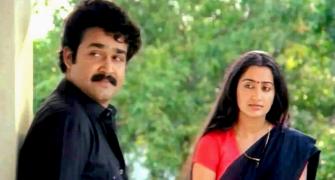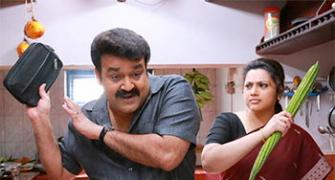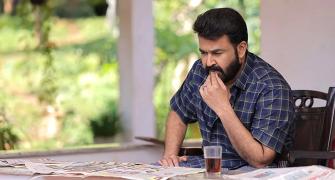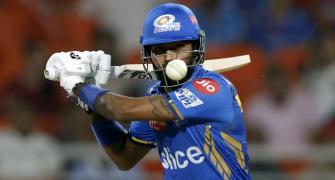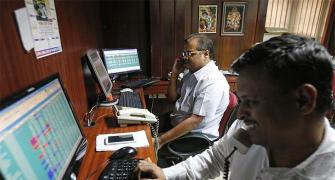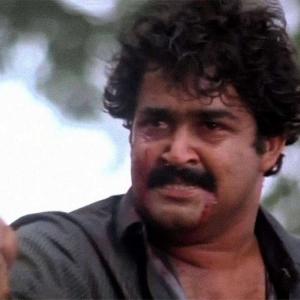'Once Mohanlal's ever-swelling entourage grasped his enormous worth, once it realized that the innate Mohanlal appeal could be profited from, it set about to exploit, to make uproars, to create the Mohanlal brand.'
'And he wasn't meant to be a brand. He was meant to be an artist, a tireless explorer of the unique seas inside him,' asserts Sreehari Nair.
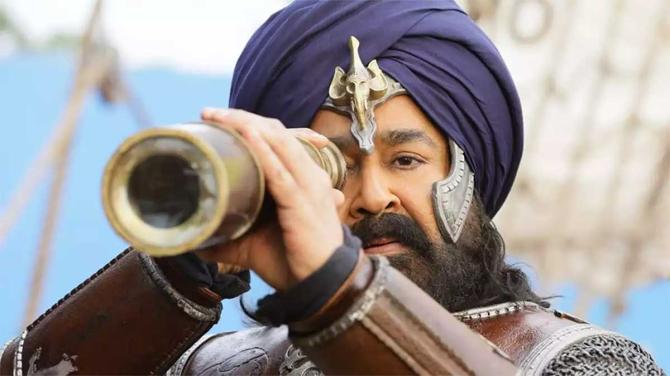
I am crying as I write this. Crying and re-browsing. It's odd.
People once cried browsing through the parlors of old mansions, complete with their creaking doors and cracked mirrors.
I am just browsing old pages of Web sites, many of which don't even load properly now.
Old Web site pages and graveyard-invoking desolate shopping malls that used to bustle with life, cheer, and bad breath: What are these but the preferred modern avenues for mourning lost time?
These pages, however, have a certain innocent energy about them.
In fact, re-browsing them, I am reminded of the title and spirit of an early John Updike story, The Happiest I've Been.
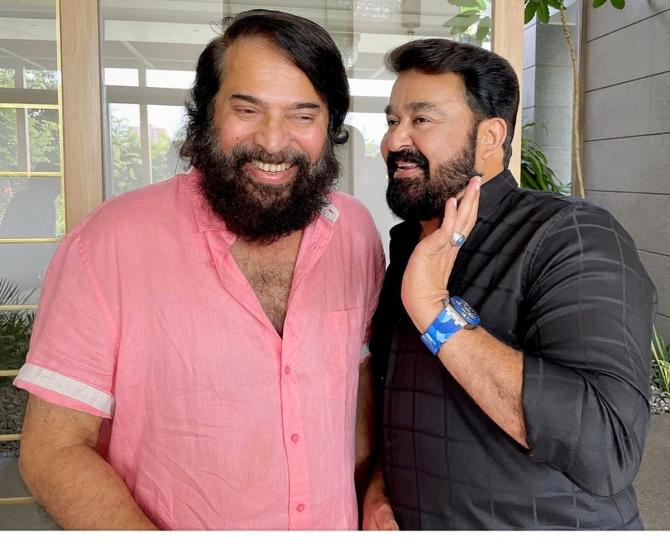
Like the protagonist of that story, we too were young and didn't even know it.
Many of us were experiencing our first steady relationship, a few of us were about to get married, some of us were nursing heartbreaks, and all of us would wait for our dial-up connections to whirr, disconnect, whirr, before one of our comments on the Mohanlal-Mammootty fan fight forum could be posted successfully.
The debates back then were elementary. They were full of snide remarks and colourful expletives.
The primary ground for the debates was Box Office.
The goal: A final word on who among these two giants was the bigger box-office draw.
There were, of course, the usual notations made about Mohanlal being a natural actor, and about Mammootty's ability to become a character and not get away with playing Mammootty every single time.
I would try to make my bones by saying stuff of the order of, 'Mohanlal can be himself every single time, and still give to each character he plays some unexplored part of his own unconscious.'
But such statements were seen as annoying detours by commentators from both sides, and collections and theatre reports remained the primary subject of dispute.
Those online fights between fans are as dead as the website pages that once carried them.
Now, after all these years, even Mammootty fans would concede that Mohanlal is Kerala's undisputed Box Office King. He is. The numbers say it plainly.
The fan fights therefore have become tepid, cursory, almost a parody of earlier times, and Mohanlal fans, today, would rather spend their time discussing the possibility of Dileesh Pothan or Lijo Jose Pellissery making a film with their favourite star, or Syam Pushkaran writing one for him.
What the fans don't seem to understand, or won't acknowledge in any event, is that it has become impossible for an ambitious film-maker to work with Mohanlal.
Yes, he may have never had it so easy, but he has never had it so bad either.
The tragedy of Mohanlal, as can be sampled at this present moment, is not that he's out of favour; it's that he has been done in by love.
And it's a very peculiar strain of love I am trying to get at, a disease almost, one that most Keralaites are gripped by, and some without their being aware of it.

The Mohanlal appeal among the public in Kerala, and by extension among Malayalis in the Gulf countries, is truly pervasive.
It goes beyond just quoting his dialogues, and I dare say it's more complex than the guileless adoration one sees showered upon other celestial superstars in the South.
The appeal has got to do with the impression he made on the Malayali consciousness as a whole in the late 1980s and early 1990s.
Without the formal consent of an entire generation of Malayalis, he charted the fine points of how they should conduct themselves in real life.
I have heard teachers, clergymen, and tea-shop owners employ his choppy intonations to make their banal talks sound improvised.
I have been witness to philosophers and black magic experts using their hands in the flowing manner he once did.
Drunkards from Kasargod to Vattiyoorkavu are known to rattle off, like many of his drunken characters, a mix of heartfelt inner truths and gibberish, rendered in slurred speech.
I am yet to meet a Mammootty fan who cannot help behaving like Mohanlal every once in a while.
It wouldn't be an exaggeration to say that when he is dissed, Malayalis lose something of their identity. Even his steady detractors suffer in their denunciations of him.
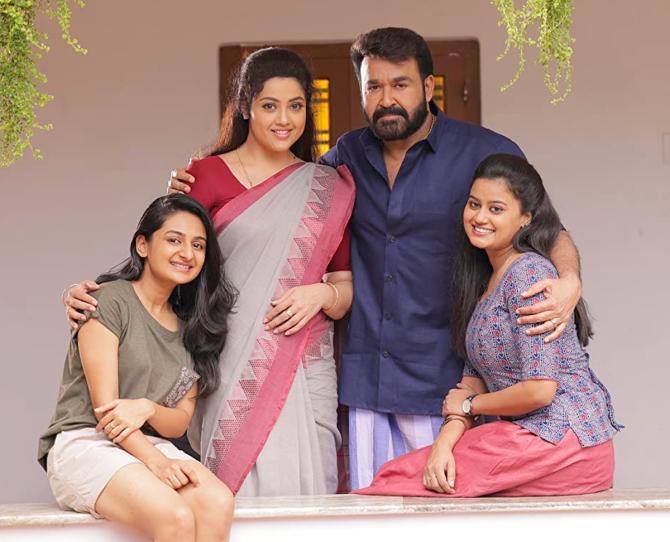
Mohanlal, to put it simply, became a part of the Malayali bloodstream long ago, and this was something that Mammootty never quite achieved -- and for that, every true Mammootty-admirer must feel eternally thankful right now.
Because love, both overtly expressed and subcutaneously present, is also what killed the actor in Mohanlal.
Because once Mohanlal's ever-swelling entourage grasped his enormous worth, once it realized that the innate Mohanlal appeal could be profited from, it set about to exploit, to make uproars, to create the Mohanlal brand.
And he wasn't meant to be a brand. He was meant to be an artist, a tireless explorer of the unique seas inside him.
At this point it would be worthwhile to step back and examine: How did this puffy-faced actor, slouch-shouldered, not endowed with the most impressive of voices (an actor's biggest equipment some might say) forge such deep ties with his audience in the first place? A tough-minded analysis would reveal that it had a lot to do with how he opened the Malayali mind and freed the Malayali tongue.
When speaking about a great artist, one always gropes for examples from the other arts to cite as comparisons.
So there was something in him of Joyce.
He was very clearly an expert practitioner of the ribald humour; a patron of the bawdy and the sordid; his finest characters (the Jayakrishnans, the Maathu Pandaarams, the Rajeev Menons) can hardly be called ideal role models to have for children. And yet, he made it all work, made it accessible, because he had that which Joyce was said to have in excess: A supreme love for the juices of life.
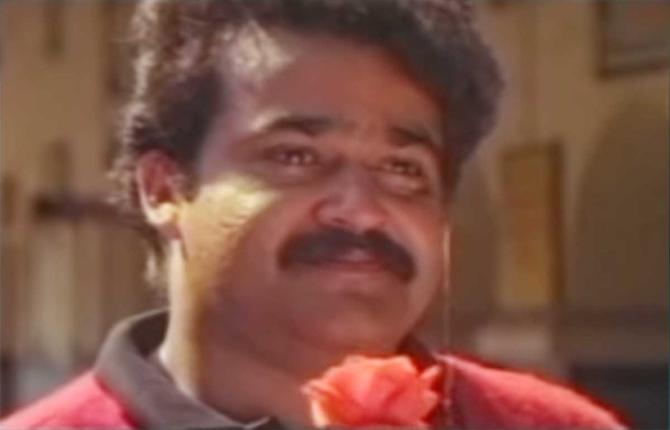
If Joyce can be considered an exemplar for his larger art, then Jackson Pollock's way of working could be seen as the archetype for Mohanlal's craft.
For when Pollock would put something up on a canvas, you felt nothing dead or glassy-eyed about the final output.
You felt the canvas covered with the energy of creation itself. And so it was the case with Mohanlal, too.
His best performances came to you steaming. You did not feel that anything at all had been worked out in advance, or sought as privileges due for past achievements.
In Vandanam, when he stops in the middle of an exchange and cracks an aside about his heroine holding a jar of Nutramul, he rises above the lines on the page and ends up dramatizing every square inch of the room he occupies.
But then, then, at ease within his sacred circle (crammed with business heads who became his de facto schedulers and script supervisors), he began to distance himself from the rhythms of life.
More tragically, perhaps, he grew increasingly intent *only on doing Mohanlal things.*
Imagine if Jackson Pollock had declared one fine day, 'From now on, expect only Jackson Pollock replicas from me.'
Sure, the economics of such a move would have been agreeable, but wouldn't it also have been the ultimate illustration of an inventive artist betraying his own talent? In the case of Mohanlal, however, audience love was deduced to be perfectly recyclable across movies, the perfect material to be used as feed for the Mohanlal brand, to be hoisted on hoardings for selling everything from Mundu to medicines for asthma, and the business heads all nodded in assent.
All this wasn't too bad, and the situation was yet salvageable. But then it began, some two decades ago to be precise, the Mohanlal Self-Memorialization Project.
Its implied logo was Mohanlal with a halo, and over the years the halo has become so prominent that it is impossible today for anyone to conceive a Mohanlal character, or fix in the audience's mind a Mohanlal character, who possesses even a degree of inwardness, of basic ineptitude, of natural human gracelessness.
Yes, he is guarded by love.
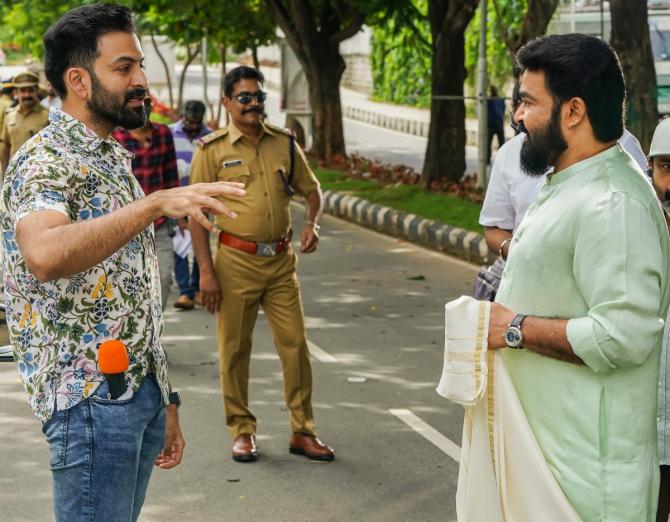
Mammootty, though in no way any less a frisson of ego and grandeur, still feels easier to fix in human terms, because as a figure he is not a victim of self-memorialization.
And you don't have to go searching for evidence of this fact in the actor's recently lauded performances.
In Unda, for instance, you felt you could touch him. But the picture itself petered out after 45 minutes or so, bringing him down with it.
Munnariyippu was, I thought, a piece of fraudulent cinema, something that you watch a second time just to see how its leading man and its screenwriter had fooled you the first time around.
Peranbu, the Tamil film he did with Ram, was poorly acted and unimaginatively directed, sentimental hogwash that tried to bruise you for too little, and which was praised by one esteemed critic for being an ode to asexuality.
No, you don't have to scan those over-praised gems to understand what I am saying.
You simply have to watch the two rupee comedies that Mammootty has done in the last 15 years or so.
Regardless of these films' quality, they tell you how Mammootty, today, has become a far better comic actor than Mohanlal.
How did this happen?
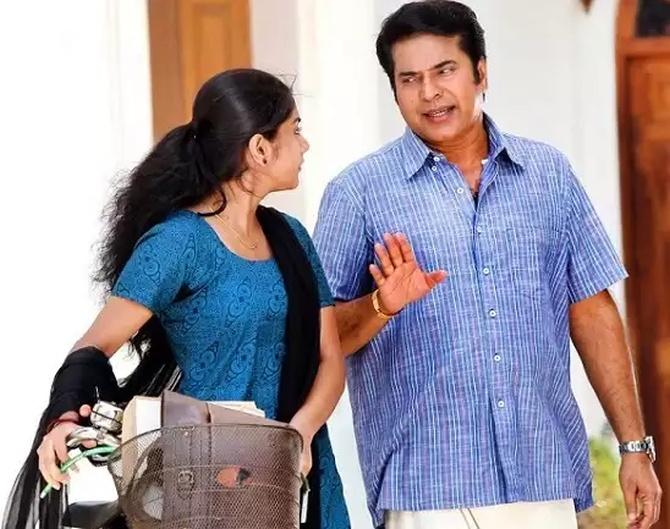
Mammootty, who was in the past taken to be inferior to Mohanlal in the humour department, discovered a new dimension to his timing by playing off of his stuck-up superstar image.
The man almost makes you believe in the benefits of having at least a moderately unfavorable public persona, in the benefits of being not universally loved, of having something to prove.
In a film like Kadal Kadannu Oru Mathukutty, his character's attempts at self-ingratiation being constantly tinged with self-mockery is what eventually rescues the film.
You try doing something like that with Mohanlal, and you would find the self-memorialization project gnawing at your efforts.
It is as pervasive as the Mohanlal appeal that set it off, and it will cancel out the many special lineaments of even an immensely enjoyable trifle like Chotta Mumbai, if attempted today.
The Mohanlal Halo -- stitched from a rag-tag bunch of such sham virtues as all-round perfection, heightened spiritual awareness, and, till a few years back, bureaucratic honor (the whole lieutenant colonel thing seems to have fallen out of favour with the branding gurus) -- has also become the symbol of his humorlessness, of his inability to go beyond certain character types.
It's a halo that he cannot afford to let an ambitious writer or film-maker disturb. And an ambitious writer had better quickly learn the ropes.
For, as matters stand now, a writer who thinks up something fresh for Mohanlal, something that would even slightly ruffle the halo, such a writer would have to cross at least two inner sanctums, and make at least one visit to the sanitarium, before his script gets rejected by... well, Anthony Perumbavoor.
So there he sits: A classic example of the emperor at his saddest as an undisputed ruler.
With every success, he sinks deeper, cuts down further on his chance at timelessness, bolsters further his chances of future anonymity.
But what can he do? What can poor Lalettan do? Can he fire his brand managers? Can he fire his fans?? Can he risk a period of sustained failure???
These options do not make sense in the demand-and-supply world that he seems to be comfortably encased in right now.
And besides, when you are an emperor tied down by love, your options are, as they say, limited.
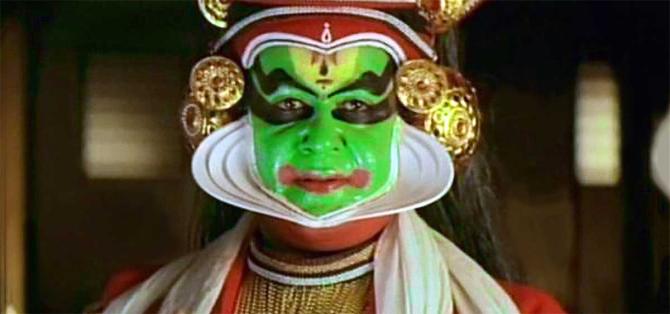
I, however, know what I can do.
And I am crying as I envision it. But these are useless tears. Tears of Camp. Because I am shedding them in front of a picture of his from one of those Major Ravi atrocities he is addicted to doing every once in a while.
'Mohanlal Saves India!' From my desktop, he beams out, pensive-looking, wearing one of those rope-covered army helmets, and speaking to me almost directly: "Mone, what harm did I ever do to you?"
Oh, but it won't work, Laletta. Not falling for it. Because I am not contributing anymore to this soul-killing, artist-destroying, public-fooling Mohanlal love machine.
For my part, I can't be serving him the death-giving elixir. So I turn away from the picture.
It's a permanent retreat this time, from an artist, from a world, from a way of life.
And the funny thing is that there's a John Updike short story for my present state of mind, too.
One of Updike's mature period stories, it is for that reason less cheerful but full of painful reflections and useful frustrations.
It concerns the last day of a long marriage that has reached a dead end. The story is called Separating.
Feature Presentation: Rajesh Alva/Rediff.com

